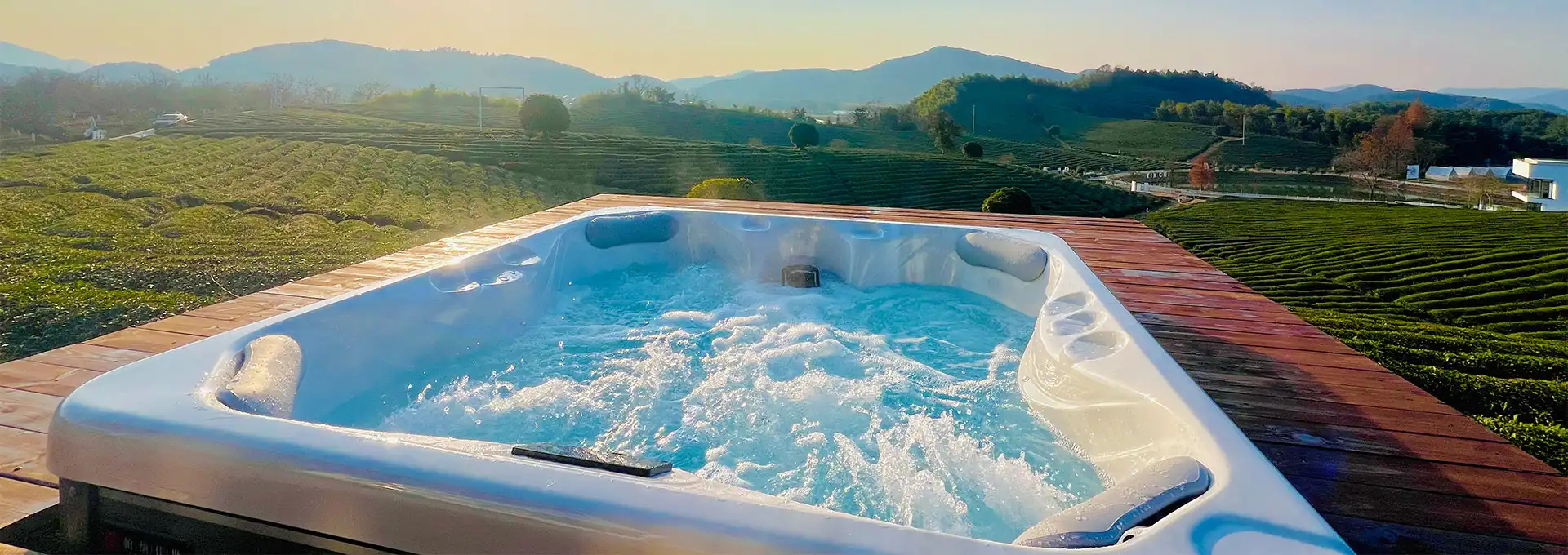Do Hot Tubs Dehydrate You?
2024-08-01 15:54:12
Soaking in a hot tub is a popular way to relax and unwind, but many people wonder about the potential health effects, particularly when it comes to hydration. The question "Do hot tubs dehydrate you?" is a common concern among spa enthusiasts and newcomers alike. In this blog post, we'll explore the relationship between hot tub use and dehydration, as well as address some related questions about outdoor luxury hot tubs.
How long is too long to stay in a hot tub?
Hot tubs are designed for relaxation and enjoyment, but it's important to be mindful of how long you spend soaking. The duration of your hot tub session can significantly impact your body's hydration levels and overall well-being. While there's no one-size-fits-all answer, most experts recommend limiting your time in a hot tub to about 15-30 minutes per session.
The reason for this time limit is primarily due to the effects of heat and water immersion on your body. When you're in a hot tub, your body temperature rises, causing you to sweat. Even though you're surrounded by water, this sweating process can lead to fluid loss. Additionally, the hot water causes your blood vessels to dilate, which can lower your blood pressure and potentially make you feel lightheaded or dizzy if you stay in for too long.
It's also worth noting that individual factors play a role in determining how long you can safely enjoy a hot tub. Your age, overall health, and tolerance to heat can all influence your ideal soaking time. For example, older adults, pregnant women, and those with certain medical conditions may need to limit their time even further.
To make the most of your outdoor luxury hot tub experience while minimizing the risk of dehydration or other adverse effects, consider these tips:
1. Start with shorter sessions and gradually increase the duration as you become accustomed to the heat.
2. Pay attention to how you feel during and after your soak. If you start to feel uncomfortable, dizzy, or overly hot, it's time to get out.
3. Take breaks between multiple soaking sessions to allow your body to cool down and rehydrate.
4. Adjust the water temperature to a comfortable level. Most hot tubs are set between 100-104°F (38-40°C), but you may find a slightly lower temperature more enjoyable for longer sessions.
5. Use the hot tub's jets strategically to target specific areas of your body without staying submerged for extended periods.
By being mindful of your time in the hot tub, you can enjoy the benefits of relaxation and hydrotherapy while minimizing the risk of dehydration and other potential issues.
Can you drink alcohol in a hot tub?
The combination of alcohol and hot tubs is a topic of frequent discussion among spa owners and enthusiasts. While it may seem like a perfect pairing for relaxation, mixing alcohol with hot tub use can pose several risks and is generally not recommended by health and safety experts.
First and foremost, alcohol consumption can exacerbate the dehydrating effects of hot tub use. Alcohol is a diuretic, meaning it promotes fluid loss through increased urination. When combined with the fluid loss from sweating in a hot tub, this can lead to more rapid and severe dehydration. The signs of dehydration, such as dizziness, headache, and fatigue, can be easily mistaken for or masked by the effects of alcohol, making it harder to recognize when you need to get out of the hot tub or rehydrate.
Moreover, alcohol affects your body's ability to regulate its temperature. When you're in a hot tub, your body is already working hard to maintain its core temperature in the face of external heat. Alcohol can impair this process, potentially leading to overheating or even heat stroke in extreme cases.
The relaxing effects of both alcohol and hot water can also increase the risk of accidents. Alcohol impairs judgment and coordination, which can be particularly dangerous in and around water. There's a higher likelihood of slipping, falling, or even drowning when under the influence of alcohol in a hot tub setting.
Despite these risks, some people may still choose to consume alcohol while using an outdoor luxury hot tub. If you do decide to drink, it's crucial to follow these safety guidelines:
1. Moderation is key. If you choose to drink, limit your alcohol intake significantly.
2. Stay well-hydrated by drinking plenty of water before, during, and after your hot tub session.
3. Avoid drinking alcohol before entering the hot tub, as it can be harder to gauge your limits once you're already in the warm water.
4. Never use the hot tub alone if you've been drinking.
5. Set the water temperature slightly lower than usual to reduce the risk of overheating.
6. Limit your time in the hot tub even more than you normally would.
7. Be extra cautious when entering and exiting the hot tub, as surfaces may be slippery.
It's important to note that many hot tub manufacturers and safety organizations strongly advise against any alcohol consumption while using a hot tub. The safest approach is to enjoy your hot tub experience alcohol-free and save the drinks for another time.
If you're looking for ways to enhance your hot tub relaxation without alcohol, consider these alternatives:
1. Herbal tea or infused water for a refreshing, hydrating beverage
2. Aromatherapy with essential oils designed for use in hot tubs
3. Relaxing music or nature sounds
4. Gentle stretching or water exercises
5. Meditation or mindfulness practices
By choosing these safer alternatives, you can still create a luxurious and relaxing atmosphere in your outdoor hot tub without compromising your health and safety.
What are the benefits of soaking in a hot tub?
While we've discussed some potential risks associated with hot tub use, it's important to recognize that when used responsibly, hot tubs can offer a wide range of benefits for both physical and mental well-being. Understanding these benefits can help you make the most of your outdoor luxury hot tub experience while maintaining a healthy balance.
One of the primary benefits of hot tub soaking is stress relief and relaxation. The warm water and jet massage can help to soothe tense muscles and promote a sense of calm. This relaxation effect can lead to improved sleep quality, which is crucial for overall health and well-being. Many hot tub users report falling asleep more easily and enjoying deeper, more restful sleep after an evening soak.
Hot tubs can also provide significant relief for those suffering from various types of pain. The combination of heat and buoyancy can be particularly beneficial for individuals with arthritis, fibromyalgia, or other chronic pain conditions. The warm water helps to increase blood flow and reduce inflammation, while the buoyancy of the water takes pressure off joints and muscles. This can lead to increased mobility and reduced pain levels.
For athletes and fitness enthusiasts, hot tubs can play a valuable role in recovery. Soaking in warm water after exercise can help to reduce muscle soreness and stiffness, potentially speeding up recovery time between workouts. The heat and massage action of the jets can also help to improve flexibility and range of motion.
Hot tubs may also offer cardiovascular benefits. While it's important to consult with a healthcare provider, especially if you have any pre-existing heart conditions, some studies suggest that regular hot tub use can lead to improvements in blood pressure and overall cardiovascular health. The heat causes blood vessels to dilate, which can lead to improved circulation throughout the body.
Beyond the physical benefits, hot tubs can also contribute to mental and emotional well-being. The act of taking time for self-care and relaxation can help to reduce anxiety and improve overall mood. Many people find that their hot tub becomes a place for reflection, meditation, or simply a break from the stresses of daily life.
Social benefits shouldn't be overlooked either. An outdoor luxury hot tub can serve as a focal point for gatherings with family and friends, promoting bonding and creating lasting memories. It's a unique setting for conversations and connections, away from the distractions of screens and technology.
To maximize the benefits of your hot tub while minimizing risks, keep these tips in mind:
1. Stay hydrated by drinking water before, during, and after your soak.
2. Start with shorter sessions and gradually increase duration as your body acclimates.
3. Pay attention to water temperature and adjust it to your comfort level.
4. Use the jets strategically to target areas of tension or discomfort.
5. Incorporate stretching or gentle exercises while in the hot tub.
6. Create a relaxing atmosphere with soft lighting, calming music, or aromatherapy.
7. Be consistent with your hot tub routine to experience long-term benefits.
Remember, while hot tubs can offer numerous benefits, they're not suitable for everyone. Pregnant women, individuals with certain medical conditions, and those taking specific medications should consult with their healthcare provider before using a hot tub regularly.
In conclusion, while hot tubs can potentially contribute to dehydration if used improperly, they also offer a wide range of benefits when enjoyed responsibly. By being mindful of your time in the water, staying hydrated, and avoiding alcohol, you can safely reap the rewards of your outdoor luxury hot tub. Whether you're seeking relaxation, pain relief, better sleep, or simply a way to unwind, a hot tub can be a valuable addition to your wellness routine. As with any health-related activity, it's always best to listen to your body and consult with a healthcare professional if you have any concerns about incorporating hot tub use into your lifestyle.
For more information on hot tub installations and to find out more about our products, please feel free to contact us at info@iparnassus.com.
References:
1. Mayo Clinic. (2022). "Hot tub safety: Tips to prevent infections and injuries."
2. American Heart Association. (2021). "Is it safe to use a hot tub?"
3. Arthritis Foundation. (2023). "Warm Water Works Wonders on Pain."
4. Sleep Foundation. (2022). "How a Hot Bath Can Help You Sleep."
5. Journal of Physiological Anthropology. (2017). "Effects of bathing on body temperature, heart rate, and blood pressure."
6. International Journal of Aquatic Research and Education. (2019). "Cardiovascular Benefits of Hot Tub Therapy."
7. National Swimming Pool Foundation. (2021). "Hot Tub and Spa Safety."
8. Centers for Disease Control and Prevention. (2023). "Healthy Swimming/Recreational Water."
9. Aquatics International. (2022). "The Health Benefits of Hot Tubs."
10. Journal of Athletic Training. (2018). "Contrast Water Therapy and Exercise Induced Muscle Damage: A Systematic Review and Meta-Analysis."
Send Inquiry
Related Industry Knowledge
- What are the Best Energy-Efficient Hot Tub Solutions for Middle Eastern Hotels?
- How to Provide a Luxurious yet Hygienic Hot Tub Experience for Guests in the Middle East?
- How Long Does It Take to Heat Up a Hot Tub?
- How to Install a Hot Tub Heater?
- Does Hot Tub Help Muscle Recovery?
- Is the Hot Tub Good for Sore Muscles?
- How to Cool Down Hot Tub?
- What is Cyanuric Acid in a Hot Tub?
- How Much Chlorine in a New Hot Tub?
- Are Outdoor Hot Tubs Going Out of Style?



